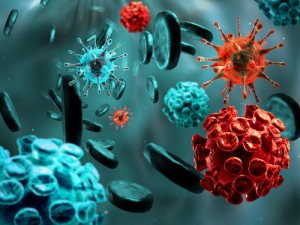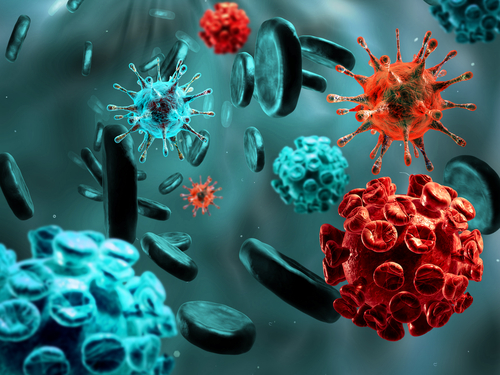 A novel study on how miR-122 inhibition influences HCV replication, entitled “Hepatitis C virus genetics affects miR-122 requirements and response to miR-122 inhibitors,” was recently published in Nature Communications by Benjamin Israelow and Gavriel Mullokandov, first co-authors from the Icahn School of Medicine at Mount Sinai, and Prof. Brian D. Brown from Icahn. This study has implications for the development of anti-miR-122-based HCV drugs.
A novel study on how miR-122 inhibition influences HCV replication, entitled “Hepatitis C virus genetics affects miR-122 requirements and response to miR-122 inhibitors,” was recently published in Nature Communications by Benjamin Israelow and Gavriel Mullokandov, first co-authors from the Icahn School of Medicine at Mount Sinai, and Prof. Brian D. Brown from Icahn. This study has implications for the development of anti-miR-122-based HCV drugs.
Hepatitis C virus (HCV) establishes a chronic infection in most infected individuals that leads to liver diseases such as cirrhosis and hepatocellular carcinoma. HCV affects 3% of world’s population and more than 3 million people in the United States alone according to the Centers for Disease Control and Prevention (CDC). Recently, reports from CDC indicated that hepatitis C infections are increasingly affecting the young population and are one of the main causes of death within the baby boomer generation. New effective treatments have been released recently, but their high prices have caused public protest and thus general limited use. Currently there is no commercially available vaccine for hepatitis C.
In this new study, the researchers evaluated the HCV response to the reduction of microRNA 122 (miR-122) that the virus needs for infection and replication inside the human cells. Surprisingly, they found that depleting the supply of the miR-122, i.e. the knockdown the miR-122, by using small RNA molecules that inhibit gene expression and cause the destruction of a specific mRNA molecules, resulted in the appearance of an HCV variant able to infect cells with minor levels of the miR-122, meaning that this variant is resistant to miR-122 knockdown. In addition, the authors found that HCV virus reduced the activity of miR-122 in the cell, probably by binding and blocking miR-122. These findings provide a better understanding of the interaction between miR-122 and HCV, including viral adaptation to reduced bioavailability of miR-122, and have crucial implications for the development of anti-miR-122-based HCV drugs.
“This effort, which was made possible by innovative microRNA analysis, offers significant progress toward precision medicine in treating HCV patients,” said Matthew Evans, PhD, Assistant Professor of microbiology at the Icahn School of Medicine at Mount Sinai and a co-senior author of the study, in the press release. “There is a critical need for more weapons in our arsenal to fight HCV — particularly for affordable, effective treatment as we try to stay a step ahead of this virus and prevent it from developing the kind of drug resistance we’re seeing in the bacterial realm.” added Prof. Evans.
Notably, this study contributed to another pivotal finding concerning the still unanswered question of how HCV leads to cancer. The research team demonstrated that HCV hijacks the mir-122 gene, diminishing its normal activity in liver cells. The mir-122 has been recognized to be a potent tumor repressor; thus, it is plausible to hypothesize that HCV inhibits cells of their natural defenses against uncontrolled growth, and the outcome of chronic HCV infection could contribute for the development of cancers.
“Our study offers broader implications for this class of microRNA genes and their interaction with targets, which may be useful for a number of diseases in addition to hepatitis C,” said Brian Brown, PhD, Associate Professor of Genetics and Genomic Sciences at the Icahn School of Medicine at Mount Sinai and co-senior author of the study. “We are also intrigued by this new information that may shed light on the link between HCV and the onset of cancer and look forward to future efforts to explore this theory.” concluded Prof. Brown.

